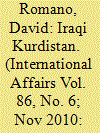|
|
|
Sort Order |
|
|
|
Items / Page
|
|
|
|
|
|
|
| Srl | Item |
| 1 |
ID:
134685


|
|
|
|
|
| Summary/Abstract |
In early June 2014, the Islamic State of Iraq and al-Sham (ISIS) and a constellation of Sunni Arab tribes and former Ba‘thists captured Mosul, Iraq’s second largest city. Much of the Iraqi Armed Forces disintegrated, and the rest fled southward from the Sunni rebel advance.1 As most of the majority–Sunni Arab areas of the country quickly fell to the insurgents, Prime Minister Nuri al-Maliki’s government scrambled to fortify Baghdad’s defenses. Peshmerga (Kurdish fighters) of the Kurdistan Regional Government (KRG), meanwhile, took the opportunity to advance farther south and take control of virtually all the territories disputed between Erbil and Baghdad, including Kirkuk, which has some four percent of the world’s proven oil reserves around it. As authorities in Baghdad struggled to mount a response to the breathtaking developments, ISIS declared the establishment of a new Islamic caliphate straddling Syria and Iraq, and the KRG announced their intention to hold a referendum for Kurdish independence.2 More than ever before, the dissolution of Iraq suddenly appeared both likely and imminent.
|
|
|
|
|
|
|
|
|
|
|
|
|
|
|
|
| 2 |
ID:
099903


|
|
|
|
|
| Publication |
2010.
|
| Summary/Abstract |
In August 2010, the United States officially ended the combat mission of its military forces in Iraq and withdrew all but 50,000 of its troops from the country. Iraqi Kurds now contemplate the implications of the looming withdrawal of the remaining 50,000, scheduled for the end of 2011. While Arab-Kurdish relations in Iraq face the risk of serious deterioration, the US military withdrawal will probably not greatly affect the internal politics of Kurdistan. Given the de facto autonomy the region has enjoyed since 1991 and the Kurds' resulting experience with self-rule, Iraqi Kurdistan never suffered from the post-2003 security and political vacuums plaguing the rest of the country. As a result, no more than a few hundred coalition troops were stationed in Iraqi Kurdistan (and no coalition casualties have occurred there since 2003), with governance and security remaining completely in the hands of the Kurdish authorities.
While important centrifugal tendencies do exist in Iraqi Kurdistan and are discussed here, the region will most likely continue to deal with Baghdad and the rest of the outside world with the united voice it cultivated after 2003. US civilian personnel and advisers will also remain in Iraq after the military withdraws, which offers the possibility of assisting Iraqi Kurdistan to overcome obstacles in order to achieve better, more transparent governance. A continuing American diplomatic engagement in Iraq also offers the possibility of helping Kurdistan further institutionalize its autonomy vis-à-vis Baghdad and neighbouring states.
|
|
|
|
|
|
|
|
|
|
|
|
|
|
|
|
| 3 |
ID:
142156


|
|
|
|
|
| Summary/Abstract |
In Turkish political circles, there is a popular quip: “The United States wanted Turkey and Iraq's Kurds to become friends, not get married.”1 As their cooperation deepens, especially in hydrocarbons, observers increasingly question whether the relationship will endure. A solid strategic relationship is born of shared national interests, mutual respect and real interdependence. Fleeting cooperation, in contrast, stems from a temporary confluence of political interests, typically dependent on the personalities and preferences of leaders who may fall from power in the foreseeable future. Such cooperation can fulfill pressing needs, but both parties know the arrangement will be discarded in short order.
|
|
|
|
|
|
|
|
|
|
|
|
|
|
|
|
| 4 |
ID:
145721


|
|
|
|
|
| Summary/Abstract |
The US troop surge and awakening movements are the two factors most often associated with the decrease of violence in Iraq after 2006. However, these policies, including a distinction between the Anbar Awakening and later Sons of Iraq (SOI) program, did not occur simultaneously. To date, it also has not been made clear whether the surge, Anbar Awakening, and/or SOI deserve credit as the intervention responsible for improving security conditions in Iraq. Hence, we compare the relative effects of these three interventions using Poisson autoregression models for interrupted time series to assess which policy reduced civilian and Coalition troop casualties in Iraq between 2004 and 2011. We find clear evidence that the non-Anbar SOI rather than the troop surge reduced casualty rates in Iraq, though this effect distinction has not been made salient in policy circles, where the conventional wisdom of a combined effect for the surge and awakening councils persists. Given this, the same kind of “surge and local militia allies” strategy held significant appeal for NATO strategists in Afghanistan. Yet for reasons we consider in the second portion of this article, a number of more challenging factors bedeviled counterinsurgency there.
|
|
|
|
|
|
|
|
|
|
|
|
|
|
|
|
|
|
|
|
|